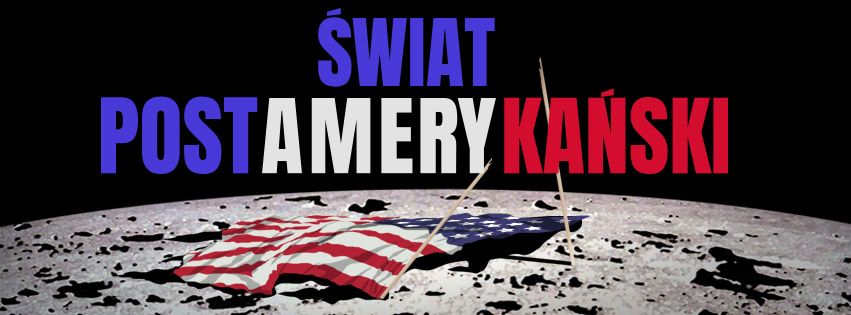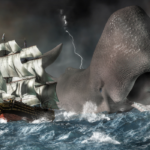
Nie masz czasu na zapoznanie się z całością artykułu?
Wystarczy, że klikniesz ikonę „oznacz artykuł do przeczytania później”. Wszystkie zapisane publikacje znajdziesz w profilu czytelnikaUSA on its way to losing the rivalry with China

Polish political elites and, perhaps even more so, their intellectual base rely on the assumption of long-term supremacy of the United States and their dominance in their rivalry with China. It can often be heard that American victory is just a matter of time. An opposite scenario, i.e. USA’s defeat, is considered as marginal, if imaginable at all. This is the assumption that Polish national security and foreign affairs are built on. It actually underlies the entire Polish politics, which was joyously focused (even on the eve of the current pandemic) on “growth and development” and the distribution of the resulting benefits as if we were still in the midst of the first decade of the transition, with its faith in the “end of a story” and “eternal peace.” As a result, the issues of security, survival of the nation and the state and their position in the international rivalry are inevitably given marginal attention.
This is a fundamental mistake. The baseline scenario is American defeat and not American victory, the latter being not impossible but highly unlikely. And this changes a lot for Poland, a country that regained independence within a transition to a unipolar world led by the USA, and 30 years later its security is essentially dependant on America.
The United States, that is the modern Carthage, are clearly facing a similar logic of the situation: aside from total war and a strike right in the heart of the opponent, there seems to be no clear way of stopping its power from rising
Like Carthage and Rome
In certain aspects, the American-Chinese rivalry resembles the rivalry between Carthage and Rome at the time of the Punic Wars in the 3rd and 2nd century BC. First of all, it is a clash between a dominant maritime superpower and a rising, initially land and then hybrid (land-maritime) superpower. What Carthage used to be in the 3rd century BC for the western part of the Mediterranean Sea basin, the United States are for West Pacific and the world today. They are opposed by China, a traditionally land superpower, which keeps intensely developing its maritime potential, just like Rome did, transforming into a hybrid power.
Secondly, the similar level of the power held by the rivals combined with substantial differences in specific aspects of that power renders it difficult to settle the rivalry in just one or several clashes. The Rome-Carthage rivalry for hegemony lasted at least 118 years, it encompassed three wars and competition in a number of fields, not only in the military dimension but also in trade, technology, alliances. Today’s situation is tremendously different but what remains the same is that we should anticipate a longer rivalry and many conflicts in various areas; they may die down and then resurface, freeze on some aspects and continue in others. After all, we have already had an opportunity to observe it.
Thirdly, similarities can be noted at the level of conflict resolution. Carthago delenda est, Carthage must be destroyed, Cato the Censor kept repeating because he believed that until this happened, the African city would always be a threat to Rome. This can be disputed, as Publius Cornelius Scipio did, if you study how incredibly weakened the Second (not to mention the Third) Punic War left Carthage. Most certainly, it would be much closer to the truth to say: Rome had to be conquered or destroyed for Carthage to keep its superpower status. By releasing the huge potential of the Apennine Peninsula, the Republic became an incredibly vital and expansive superpower, unstoppable by single defeats and highly capable for regrouping after losses. This was visible for instance in the First Punic War. Hannibal seemed to have understood this as he gathered a huge land army and attempted to attack the opponent’s capital. As we know, he failed and as a result he lost the Second Punic War and the future of Carthage. The Third Punic War was only about whether the city remained autonomous as a Roman client or was to be deprived of its autonomy and destroyed.
The United States, that is the modern Carthage, are clearly facing a similar logic of the situation: aside from total war and a strike right in the heart of the opponent, there seems to be no clear way of stopping its power from rising. And if this rise is not halted, America will permanently lose its status of world’s number one superpower that sets, and is the primary beneficiary of, the international rules. Just like Carthage wanted to establish the terms of trade in the western part of the Mediterranean Sea basin. This is not a mere forecast but a description: the process is already happening.
Dragon in global salons
The most spectacular and paradoxical manifestation of the process is the fact that under the reign of Donald Trump, the United States started to challenge the international rules they themselves had established. They engage in trade wars, they weaken international institutions, their actions lead to increase of duty fees and foster protectionism and nationalism. They weaken the globalisation that they have established themselves in its current form and that they used to be the leaders of, with ironic responses from the despotic China, now publicly defending free trade and the current order, as Xi Jinping did at the Davos forum in 2017.
Under the reign of Donald Trump, the United States started to challenge the international rules they themselves had established. They engage in trade wars, they weaken international institutions, their actions lead to increase of duty fees and foster protectionism and nationalism
This is the effect of disregarding the warning of Napoleon, who acutely stated: “Let China sleep; when she wakes she will shake the world.” The USA woke up the dragon in the 1970s by including it in the globalised economy and thus allowing it to keep control over strategic resources (unlike during the subsequent transformation of Central Europe). This way, China was able to take a developmental leap that had no precedent in the economic history of the world, as measured by bridging the more than ten-fold gap in the global production share between those superpowers in just 34 years. In 1980s this was 2.2 percent (China) versus 25 percent (USA) for purchasing power parity (PPP). In 2014, China overtook the United States in that respect. Today, their PPP is higher by 1/3, and when it comes to the GDP, Chinese economy represents 67 percent of the American economy and the gap is closing quickly. At the peak moments of the previous strategic rivals of the USA, that ratio was 40 percent for the Soviet Union and 26 percent for the Nazi Germany.
Letting China into the globalised world made sense in the era of the first cold war as it broke apart the communist block and engaged the Dragon against Moscow. But failure to stop the integration between Beijing and the global system in time led to a situation where it grew into a superpower comparable to the USA and the largest beneficiary of globalisation and at the same time the greatest revisionist of the international system. This superpower penetrated the cracks in the system like water, gradually using its logic for its own gain. Revisionism is evolutionary, which means it involves entering subsequent points of the system and increasing the impact on that system through a large number of relatively small actions that either remain outside of the strategic perception of the rivals or are like salami slices – too small to risk any major confrontation over them. This leads to the greatest paradox of our times, namely that the United States must question the rules they have themselves established in order to reverse the tendencies that are harmful to them. Such actions lead to confusion and dissatisfaction of many of their allies, especially in Europe. And so they open more and more cracks for Beijing to penetrate – which it does.
Unsuccessful offensive of Washington
So far, America has taken two attempts to stop that process, both unsuccessful. The first one was Barack Obama’s “pivot to Asia” in 2011-14. It was mostly rhetorical as it came down to thunderous speeches and symbolic strategic signalling intended to show that the USA would not allow anyone to knock it off the pedestal, whether in Asia or anywhere else in the world. It ended with a spectacular failure: China adopted openly superpower rhetoric, took the lead in the GDP versus the PPP, and instilled even more doubt among American allies (such as Philippines or South Korea). Last but not least, it shifted the influence in the key South China Sea by building artificial Chinese islands and winning the conflict for Scarborough Shoal.
After several years deep strategic consideration (during which time the balance of power considerable deteriorated), the USA entered stage two. Already ruled by Donald Trump, who had promised to “make America great again,” it in fact started a new cold war in 2018. The war has three main dimensions – strategic, technological and commercial – and unlike Obama’s pivot it encompasses a number of specific actions. This is not the place to describe them in detail. But the essence is simple: even by hitting China painfully (and sometimes harming itself), the USA was still unable to reverse the catastrophic trend where the rival developed more than twice as fast. And it kept changing the balance of power to the disadvantage of America.
The current relations may be unaware of the essence of things. The USA is on the offensive: it strikes, shifts the power, attracts the interest of the media. It succeeded in weakening Chinese technological giants, including ZTE and Huawei, reduce the trade deficit, halt the expansion of the Middle Kingdom in the East China Sea, disrupt Chinese production chains through restriction of access to semiconductors. But it failed to stop Chinese capital and political expansion in Asia, Europe and Latin America, not to mention Africa. One of the main targets of the attack, Huawei keep growing its business in such important ally countries as the UK and Poland. Israel, despite major criticism from Washington, did not withdraw from the handover of the strategic port in Haifa to the Chinese for management. South Korea, a key ally in West Pacific, drifted further away from the USA in terms of security. China stays calm in response to American commercial sanctions, either by introducing symmetrical restrictions or by procrastinating and accepting them. It responds to technological sanctions with exclusions in its own market and by driving internal demand. Last year, the disproportion between the wealth growth between China and America was even greater than a year before (6.1 and 2.3 percent of the GDP growth versus 6.6 and 2.9).
Due to the close integration of the Middle Kingdom with the global (and especially American) economy, every economic strike against Beijing rebounds to hit the USA and others. This is why the USA cannot afford a full-blown economic war with its main opponent without dragging itself and the rest of the world down. The efforts made by the USA to ensure economic decoupling are a theoretical solution to the problem that unties the Washington’s hands. Theoretical, because it is not possible to quickly reverse the structural changes that have taken place in the international economy over the past forty years without ruining America and its allies. This is why the progress to date of the high-sounding decoupling is barely visible and is met with substantial resistance.
Things are similar in the military and strategic field. Further manifestations of American power in Indo-Pacific, continued fortification of Taiwan, revival of the cooperation with the Philippines, Japan and India – all this impeded Chinese expansion in the region. But this is it. China continues intense armaments, it develops the navy and every year it reduces the disproportions in the military power. Its spending on the army versus the GDP is more than 1/3 below that ratio for the USA and as such its growth reserves are higher. It also has more vessels than America (and the world’s largest fishery and commercial fleets, which may be partially militarised if needed) and that disproportion keeps increasing. Additionally, it has the comfort of strategic depth, proximity to the theatre of the potential war, so distant and costly for the USA. It also enjoys the luxury of having its military resources gathered in one region, while American resources are dispersed all over the world. At the same time, USA’s endeavours to reinforce the highly neglected fleet experience considerable internal difficulties and are considered as highly insufficient even within the United States. Besides, there is not so much as a promise of a breakthrough in the capacity to overcome of the Chinese Anti-Access/Area Denial (A2AD) system, which renders a major part of the American offensive potential in that region useless, including the aircraft carriers. From the point of view of the USA, the arms race with China in the Indo-Pacific looks more and more like a trap similar to the one set up by Reagan for the Soviets.
The basic task of the USA is to stop China in Asia and Indo-Pacific. To the United States, Europe, our region included, is a third-rate strategic theatre (disputable: whether before or after the Persian Gulf)
In short, Trump’s policy of stopping China is a failure. Less so than Obama’s pivot but a failure nonetheless. China still seems too powerful to submit to the kind of pressure that the USA has been putting on it recently. America’s actions seem way too late. Three dates seem crucial here: 1991, 2001, 2011.
After the breakdown of the USSR in 1991, Nixon’s manoeuvre of turning China lost its geostrategic validity. At that time, the United States had any tools to stop or at least slow down the growth of its future rival. But they fell victim to their own hubris (connected with the huge advantage over every competitor during the unipolar moment) and greed (resulting from the investment appeal of China). In 2001, they allowed the Middle Kingdom to join the World Trade Organisation for the same reasons and thus opened the door to its global expansion and turned a blind eye to its protectionist practices that violates the rules of the organisation. At the same time, after the September 11 attacks, the United States engaged in lengthy wars in the Muslim world.. Finally, in 2011, when China was already a serious rival, the situation could have been explored better and actual rather than pretend actions could have been taken to stop it. Many American analysts had postulated that for years. If China the same pressure as now or greater had been put on China then, the outcome would be most certainly more favourable for the USA because the balance of power was pointing to that. But now it is too late, as a titan of political realism and a known advocate of stopping Beijing, Prof. John Mearsheimer, has said recently.
Is he exaggerating? Perhaps. It is hard to precisely predict the future, including the exact impact of still unknown technological innovations, climate changes or cascade consequences of the epidemic on this rivalry. At least I am unable to do it. A major part of social reality is unpredictable by nature, it is the domain of “black swans” and non-transparent complexities.
How can China be defeated?
I can see three ways for America to reverse the negative trend. This is all quite theoretical. The first one is the Punic way – striking the opponent in the heart and starting a total war. The most efficient advantage that the USA has over China is the nuclear arsenal. With more than twenty times more missiles, America may turn the opponent into ashes, while Beijing may “only” destroy the centres of several or a dozen cities of the rival, killing about a million people, as estimated by Prof. Hugh White. But “only” makes a huge difference here. Would America be willing to make such a sacrifice to save its global supremacy? Well, it would not. For more details, please refer to an excellent essay by Hugh White with the telling title “Without America.”
One of relative power shifts caused by the pandemic may go towards non-Chinese East Asia, which would give America much greater possibilities of balancing out the growing influence of Beijing
The other way, a less academic one, is to modify the international order in line with the principle “for everything to stay the same, everything must change,” to make it work again for America more than for China. Such an attempt was undertaken by Obama when he initiated the transpacific and transatlantic free trade zone (TPP, TTIP) to reposition USA as the centre of the capitalist world and leave China out. It would most likely have been insufficient but it was definitely a step in the right direction for America. Both projects fell because of Trump. His promises include no alternatives.
The third way, the least but still highly improbable, is to transform that rivalry into a game with a negative total without an escalation to a nuclear Armageddon. If American elites and the public were able to accept the endless economic and human losses in the name of major weakening of China in order to improve the balance of relative power and block the march of the Middle Kingdom towards global supremacy, they could capitalise on the huge advantages they still have. First of all, the conventional army, but also the currency and technology. A victorious aerial and maritime war in the Pacific would probably not break but could seriously weaken China, and so would a currency war, ruinous for their economy, based on the huge advantage of “King Dollar” as the main global backup currency.
The problem is that every such event would cause tremendous losses also for the USA. Are the Americans ready to accept them? There is nothing to suggest they are. What is one of the greatest assets of the United States, that is their excellent geopolitical location, is also a major weakness in their rivalry with China. The essence of the conflict, that is the dominance of the Middle Kingdom in East Asia and West Pacific, affects America’s fundamental interests. At the same time, even if Beijing succeeds, it is still far from creating an existential threat to the USA in the Western Hemisphere. This radically undermines the motivation to fight till the last breath. Especially since it may always escalate beyond control into a nuclear war.
So considering the available knowledge and the reasonably foreseeable aspects of the reality, America is on its way to defeat, while China is on its way to becoming a number one superpower. This is the baseline scenario. Not inevitable but highly likely.
Does the SARS-CoV-2 pandemic change this? How does it affect the presented logic? It is too early for holistic evaluations. The data at hand, which show that the pandemic in East Asia is less severe than in the West, point to a repeat from 2008, when everyone lost on the financial crisis but it affected the USA and Europe much more. This caused a serious shift in relative power towards Asia, with China on top. China made huge mistakes at the initial stage which resulted in greater severity of the pandemic than in non-China East Asia: in Japan, South Korea, Taiwan, Singapore. Out of those countries, only the first one has a superpower potential but the others still have substantial strategic significance. So a hypothesis should be taken into consideration that one of relative power shifts caused by the pandemic may go towards non-Chinese East Asia, which would give America much greater possibilities of balancing out the growing influence of Beijing. At the same time, the much lower severity of the pandemic in the Middle Kingdom than in other main Western countries, especially the USA, suggests further changes in the balance of power to the disadvantage of the United States.
The baseline scenario of the American defeat in its rivalry with China forks into two basic scenarios, both for the world and for Poland. In the first one, the crucial question is what international order will emerge from the chaotic transformations we are currently facing. It may be bipolar, if the USA and China keep or increase the advantage of relative power over other countries. In this variant, the (relatively) declining America will make numerous attempts to secure its position but as its possibilities versus its needs will be decreasing, it will be forced to keep withdrawing from various strategic theatres and areas of rivalry. China will step in some or all of them. Today, it does not have sufficient potential to replace Pax Americana with Pax Sinica but it may gain it in time. This order will be subject to intense changes but it will be relatively steady, as steady as the cold war order used to be.
However, it can also be a multipolar order if the changes are sudden, or on the contrary, if China and the USA are stuck in a rivalry weakening them both and relatively empowering other players, allowing them to grow into major superpowers. Japan, India, Russia, Germany, Indonesia and Brazil are definitely waiting in line. Such an order will be obviously less stable and characterised by more conflicts.
We should anticipate the return of attempts at a reset with Russia in America. Whether this will succeed remains to be seen but it is yet another argument to be ready for the USA’s withdrawal from or limitation of its presence in Europe
Poland needs strategic self-reliance
From Polish perspective, this leads to one fundamental conclusion: the need to achieve strategic self-reliance. The progressing destabilisation of the system means both major threats and major opportunities. Without building the ability to participate in the new international game as a self-reliant entity, we will be merely an object. A client that can only choose which superpower to follow.
The baseline nature of the scenario involving the defeat of the United States in their rivalry with China means that the continuation of their protection over Poland is substantially threatened. After all, the USA is already experiencing, and will experience even more, a tremendous pressure to consolidate its dispersed resources in priority regions. Its basic task is to stop China in Asia and Indo-Pacific. To the USA, Europe, our region included, is a third-rate strategic theatre (disputable: whether before or after the Persian Gulf). Keeping the American presence there depends primarily of three factors: on how fast their relative power is declining, on the usefulness of Europe in stopping China and on the relations with Russia.
The relative power of the USA is declining quickly and so far there is nothing to indicate that this trend will change. The usefulness of Europe in stopping China is currently very low. But withdrawal of the Americans from the Old Continent is likely to reduce it even further. This and the other factor, i.e. the pressure of the American (and less so: of transatlantic) establishment to preserve the status quo, gives the United States a reason to stay in Europe. For now – until their likely ultimate defeat in the rivalry with China.
From Polish perspective, this leads to one fundamental conclusion: the need to achieve strategic self-reliance
As far as the relations with Russia are concerned, it is common knowledge that Trump wanted their normalisation, a reset. This is because he saw, and rightly so from the perspective of American national egoism, that the conflict with Moscow unnecessarily dispersed the increasingly limited resources of Washington and pushed the variant of using (or at least neutralising) the Russian potential against China it that fight further away. This trend was halted by the accusations regarding the involvement of Kremlin in Trump’s election, the objections of a large and influential part of the American strategic establishment and the faith in concurrent victory on all fronts. All those factors are declining and the tendency is most likely to continue. And so we should anticipate the return of attempts at a reset with Russia in America. Whether this will succeed remains to be seen but it is yet another argument to be ready for the USA’s withdrawal from or limitation of its presence in Europe.
To conclude: there are more factors in support of the reduction rather than preservation or increase of American involvement in the Old Continent. And this makes the scenario where Poland will have to do without the protection of the USA even more likely.
So once again: strategic self-reliance. This should start with abandonment of procrastination, of satisfaction with the status quo in internal affairs and of the singles-variant wishful thinking in foreign affairs. Certainty is no longer the baseline scenario as it has been replaced by uncertainty. Also when it comes to sustainability of a situation where the United States guarantee Poland’s safety.
Translation financed by the National Freedom Institute – Centre for Civil Society Development from the Civil Society Organisations Development Programme for 2018-2030

Tłumaczenie sfinansowano przez Narodowy Instytut Wolności – Centrum Rozwoju Społeczeństwa Obywatelskiego ze środków Programu Rozwoju Organizacji Obywatelskich na lata 2018-2030


Zobacz
The idea of “Solidarity” has been killed in Poland after 1989. Law and Justice fills this space only rhetorically
The tragedy of Poland is that it had to conform to the demands of the international Western community. It had to become aggressively capitalist and corporatist and it could not assert its independence. Jarema Piekutowski interviews Maurice Glasman
Khanna: Just because I'm a geopolitician by education, does not mean I'm an ideologue. Conectivity today is a battlefield for influence
Is Parag Khanna the second Fukuyama? Will we see a brutal race for the greatest possible connectedness? Or will conectivity bring peace, reduce the number of classic warfare? What will be the role of the West in this competition, and how much will the Belt and Road initiatives mean? Will nation-states fade away in favor of tribalism?
A Tale of Two Monsters and Four Elements: Variations of Carl Schmitt and the current global crisis
We have a class of scientific technocrats directing the work of a class of politicians without honour, who utterly subordinate everyone else. Only a spiritual revolution will save us now
India is, and will be a non-aligned power in the New Cold War
India is a non-aligned power; this move not only protects its own varied relations (as seen with India-Russia ties and even India-China bilateral) but also allows it to provide guidance and support to smaller economies in Asia and the Indo-Pacific
The Sino-Russian relationship should not be seen as an alliance of revisionist powers
Chinese do not feel comfortable with the seemingly endless “endism” produced by Western intellectual elites, be it Fukuyamanian “end of history” at the end of the Cold War, or the recent variant of the “end” of the so-called liberal international order (LIO)
























Do autora. Szanowny Panie, doskonała analiza, choć pozostawia niedosyt w kwestii, co Pan radzi polskim politykom – mam nadzieję, że nie jest to trzymanie się, jak pijany płota, doktryny Giedroycia o przyjaźni z naszym wschodnim sąsiedztwem kosztem polskich mniejszości w tych państwach i kosztem zakłamywania historii, zwłaszcza jeśli chodzi o neobanderyzm na Ukrainie. Tłumaczenie jest dobre. Znalazłam jednak jeden błąd. Mianowicie, obecnie jest: (This is the baseline scenario.) Not inevitable but highly unlikely. powinno być: highly likely.
Z poważaniem,
M. C.
PS. Dziękuję za link na tweeterze, pewnie bym tego tekstu nie przeczytała